
The youth, often heralded as the future of any country, faces significant challenges in Pakistan due to pervasive poverty and a lack of educational opportunities. UNICEF reports a staggering 22.8 million children between the ages of 5 and 16 are out of school. The World Bank projects that, by 2023, poverty in Pakistan will escalate to 37.2%. This dire economic landscape forces many young individuals to abandon their homes in search of better prospects, with 3.3 million ensnared in child labour, according to UNICEF.
The difficulty of these children does not end there. Vulnerable and destitute, they are frequently subjected to physical, mental, and sexual abuse. Alarming statistics indicate that children under the age of 18 who end up on the streets face an 80-90% risk of sexual assault.
In the Khyber-Pakhtunkhwa (KP) province, many children, in their desperate search for money and employment, gravitate towards truck stops, known locally as "truck addas." Here, they fall prey to truck drivers who exploit their vulnerability, offering money in exchange for fulfilling their desires. This harrowing practice, known as "bacha bazi," has roots in Afghanistan, where young boys are kept as sex slaves in return for basic necessities.
Tragically, these children, with no safe haven to escape to, succumb to this exploitation, enduring immense physical and mental trauma. Psychiatrist Dr Khalid Mufti has highlighted that when these abused children are interviewed by male doctors, they exhibit a profound reluctance to respond, perceiving men as tyrannical and powerful oppressors. This deep-seated trauma fosters a pervasive hatred and fear of men among these young victims.
In the Khyber-Pakhtunkhwa (KP) province, many children, in their desperate search for money and employment, gravitate towards truck stops, known locally as "truck addas"
It is pertinent to note that Pakistan, as a Muslim-majority state, views homosexuality as a grave sin, and is explicitly condemned in the Quran. Despite this, many involved in the practice of bacha-bazi rationalize their actions. When questioned, they often claim their desires necessitate such behaviour. Truck drivers, for instance, argue that prolonged periods away from home compel them to seek alternative means of satisfaction. These individuals present various justifications, asserting that their actions are a response to unfulfilled needs and even going so far as to claim that the children involved do not object to these acts. Such rationalizations not only highlight a profound moral and ethical dissonance but also underlines the urgent need for societal awareness and intervention to protect these vulnerable children from exploitation and abuse.
Moreover, the penalties for child abuse in Pakistan are harsh and include imprisonment, fines, and even the death penalty. Section 376 (1) of the Pakistan Penal Code in its proposed form reads: “Whoever commits [child sexual abuse] be punished with death or imprisonment for life without parole till death and shall also be liable to fine.” However, due to poor enforcement of these laws the abusers seem to be roaming around free and thousands of children are being incapable of leading a proper life.
The Human Rights Commission in a recent report has contended that over 11% of Pakistani children are being abused every single day.
Moreover, these children frequently fall victim to drug dealers who exploit their vulnerability and naivety. These dealers lure the children with promises of temporary relief through drugs, leading them to addiction at an alarmingly young age. Once ensnared in this cycle of dependency, quitting becomes a formidable challenge. To sustain their addiction, these young individuals often resort to criminal activities, including theft and prostitution. The devastating impact of drug addiction further exacerbates their already dire circumstances, entangling them in a cycle of exploitation and crime.
Amidst its ongoing turmoil, Pakistan grapples with myriad daily challenges, often overlooking pervasive issues such as bacha-bazi. For years, politicians have exploited the uneducated population, offering short-term benefits while neglecting long-term solutions. It is crucial to shift focus towards sustainable policies that secure the nation’s future.
To eradicate such heinous acts from society, comprehensive reforms are essential. Justice must be rigorous and unwavering, ensuring that perpetrators of bacha-bazi face severe punishment to deter future offenders. Establishing care homes and shelters for runaway or homeless children is vital, where they can receive education and have their basic needs met. Most importantly, providing free education and raising awareness about its transformative power are fundamental steps.
Only through these measures can Pakistan hope to forge a brighter future for its children. By prioritizing education and protection, we can ensure these young lives are not only saved but empowered to contribute meaningfully to the nation’s progress.

